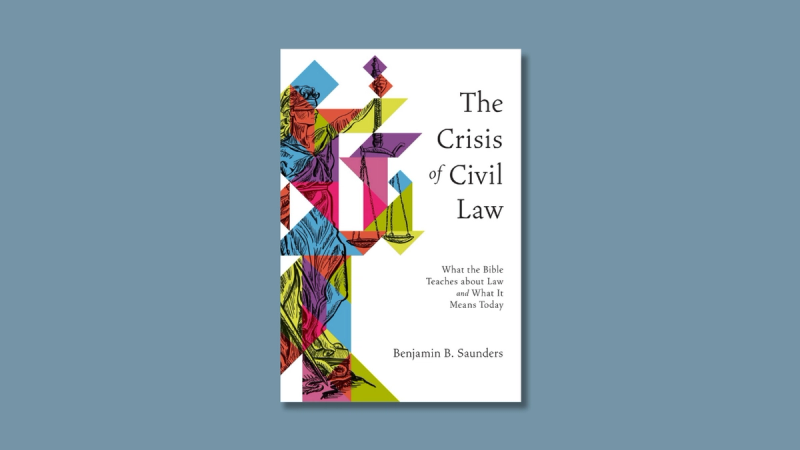The Crisis of Civil Law: What the Bible Teaches about Law and What It Means Today
by Benjamin B. Saunders
Lexham Press | 2024 | 224 pages (paperback) | $22.99
Few Christians today doubt that our relationship to our civil governments has gotten at least more complicated, if not outright harder, in recent years. Still, we often do not know how to navigate that challenge very effectively. We can be left thinking that we simply need the right person in office, which would then make everything snap together in a better way.
In The Crisis of Civil Law, Benjamin Saunders offers magnificent clarity concerning these issues to help us have more precise and manageable categories for Christians living within particular societies. He highlights how the main issue in this challenge is not so much government per se, but law. The legal code of any given society is the baseline—although enforced and applied by governments—for regulating life of citizens. Hence, we need a clearer understanding of law in order to find our footing as cultural values change, and we look for the ways forward.
The topic of law, especially civil law, can seem impenetrable to ordinary Christians. We understand the basics of how to live lawfully in our society. The bureaucracy of the entire legal system with all its intricacies is still frequently beyond us. At rock bottom, we want where we live to uphold and even to foster justice and godliness inasmuch as that is possible at the civic level. How that connects to the legal systems in which we live is another question.
The first strength of Saunders’ book is that it provides far more categories for understanding the law biblically and in civic terms. His discussion is probably the best concise explanation of the traditional distinction of the moral, ceremonial, and civil laws concerning the legal code under the Mosaic covenant. This distinction helps us understand why some laws from the Old Testament—particularly the Ten Commandments—still obligate us today in the New Testament. It also gives us a clearer perspective on why so many laws do not still bind us, at least not in the same way.
Saunders’ brings to bear the longstanding Christian doctrine of natural law to illumine how this distinction works. Because God built humanity to bear his image, we have his character imprinted upon us. This aspect of our constitution means that we have a responsibility to reflect God’s good character—his righteousness and justice—in our conduct. The moral law as summarized in the Ten Commandments really just restates these natural obligations. It revealed it anew as part of the covenant charter. That special revelation, however, was a fresh announcement of what was already true concerning the obligations we have before the Lord by nature.
The second strength is how clearly Saunders clarifies the intersection of biblical categories with civil law. As he describes it, civil law is meant to be the body of legal material that regulates how a specific society applies the natural, moral law. Even for Israel, the civil laws gave principles and precedents for how to work out the moral law in regard to more concrete circumstances. Israel’s civil laws themselves do not bind nations today because those statutes were a fitting application of the moral law to a specific society in a particular time. That application likely does not fit our present context readily.
For example, Saunders highlights the law in Deuteronomy 22:8 that required Israelites to build a parapet around the edge of the roof on any new house. This law’s function was to protect life in a culture where rooves were flat, and people spent much time on their roof. It was a risk minimizing statute. The same law about parapets would likely not serve the same usefulness in most modern Western cultures—except building code likely still requires flat topped buildings to have something along these lines. A law about a different matter that also prevents endangerment. Our laws against text messaging while driving would have been non-sense and non-applicable in ancient Israel. Still, these laws serve the same purpose of minimizing needless endangerment as some of the civil laws from Israel that may seem arcane to us today.
This book’s third strength is how it shows ways to bring the biblical rationale of civil laws to bear in modern times. He helps us parse out the structures of law that can be lost to most of us who do not have specialist training in the legal field. These insights show what is involved in assessing valid laws and how to situate them within broader legal structures.
The other part of this third strength is the wisdom for navigating the considerations of obeying and disobeying laws in contexts where Christians are at tension with at least parts of the civil law where we live. Our tendency can be toward the extreme ends of entire acquiescence or full rebellion. Saunders points us to the more nuanced way of assessing individual laws with objective and clear criteria to measure the best and right response in each situation.
The only weak spot in this book seems to be the chapter about objections and errors. At points, it seems like a rushed commentary on various approaches to the issue of civil law without extensive engagement. I sympathize greatly with his rejection of theonomy, his critique of Anabaptist retreatism, and his pushback on the modern rejection of natural law. I was less convinced by his discussion about the paradigms of transformationalism and two kingdoms. That said, the feelings of dissatisfaction may be reversed for those who are more aligned with those other criticized viewpoints.
That minor qualm does not undermine how this book is the best volume available on navigating the issues of biblical law in the modern contexts of civil legislation. It will bring clarity and balance to a hard discussion. It will also bring wisdom for how to live out our principles.





